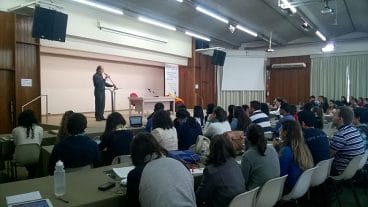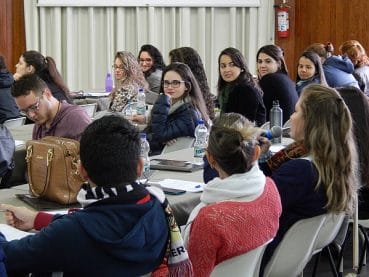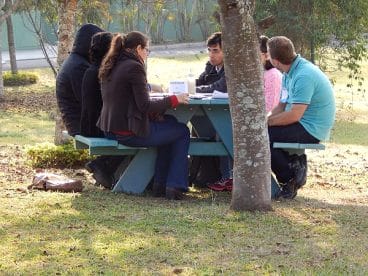 “I was totally demotivated in my profession as an engineer…Now I have rediscovered its importance in another light…” “I am in my second year in architecture. The university presents it in a very commercial light, where the human aspect is missing. This course has exceeded my expectations.” These were just two of the many impressions expressed by the 80 Latin-American university students at the end of the intense week of the course (25-30July), at the Mariapolis Ginetta Congress Centre close to Sao Paulo, Brazil. This cultural initiative promoted by the Sophia Latin-American Academic Centre (ALC) of the Focolare Movement, was an innovative project, well expressed by its title: “The theoretical-practical fundaments of the paradigm of fraternity, projected in the social, political, economic and cultural sciences.”
“I was totally demotivated in my profession as an engineer…Now I have rediscovered its importance in another light…” “I am in my second year in architecture. The university presents it in a very commercial light, where the human aspect is missing. This course has exceeded my expectations.” These were just two of the many impressions expressed by the 80 Latin-American university students at the end of the intense week of the course (25-30July), at the Mariapolis Ginetta Congress Centre close to Sao Paulo, Brazil. This cultural initiative promoted by the Sophia Latin-American Academic Centre (ALC) of the Focolare Movement, was an innovative project, well expressed by its title: “The theoretical-practical fundaments of the paradigm of fraternity, projected in the social, political, economic and cultural sciences.”  The Latin-American youths penetrated deeply into the wounds that still afflict their peoples: the socio-economic crisis, drama of the indigenous populations, and great issues of the Amazon, the social inequality and violence, of which,” as the Argentine political expert, Juan Esteban Belderrain, commented, “Latin America holds the said world title. In 2012 the number of homicides rose to over 140,000, one third of the world index and over 50,000 in Brazil alone. This sad phenomenon is on the rise. Against this dramatic background the course members delved into the cultural novelty introduced into their own disciplines, to imbue thoughts and lifestyles with the concrete activation of the paradigm of fraternity. For example, as explained by the Brazilian professor, Marconi Aurélio, and Political Sciences professor, Silva, with the application of this paradigm already practised for 20 years, politics overcomes the conflicting dimension, majorities and oppositions are viewed as complementary, part of the truth can also be gathered from opponents, and the participation of citizens is activated.
The Latin-American youths penetrated deeply into the wounds that still afflict their peoples: the socio-economic crisis, drama of the indigenous populations, and great issues of the Amazon, the social inequality and violence, of which,” as the Argentine political expert, Juan Esteban Belderrain, commented, “Latin America holds the said world title. In 2012 the number of homicides rose to over 140,000, one third of the world index and over 50,000 in Brazil alone. This sad phenomenon is on the rise. Against this dramatic background the course members delved into the cultural novelty introduced into their own disciplines, to imbue thoughts and lifestyles with the concrete activation of the paradigm of fraternity. For example, as explained by the Brazilian professor, Marconi Aurélio, and Political Sciences professor, Silva, with the application of this paradigm already practised for 20 years, politics overcomes the conflicting dimension, majorities and oppositions are viewed as complementary, part of the truth can also be gathered from opponents, and the participation of citizens is activated.  This new cultural paradigm was also put into practice in the interpersonal relationships between students and professors of various Latin-American cultures, in an interdisciplinary and multicultural dimension. But there is even more. Starting from the youth who undertook to identify the greater urgencies of their cities and with the support of the professors, projects covering the political, economic and social aspects were laid out and implemented. In conclusion, Prof. Sergio Rondinara of the Sophia University Institute (Italy) of which Sophia ALC is the first extra-European section, expressed great hope in his welcoming speech, and said that this reality gives “a beautiful, crystal-clear view of the future of this continent which has extraordinary potentials.”
This new cultural paradigm was also put into practice in the interpersonal relationships between students and professors of various Latin-American cultures, in an interdisciplinary and multicultural dimension. But there is even more. Starting from the youth who undertook to identify the greater urgencies of their cities and with the support of the professors, projects covering the political, economic and social aspects were laid out and implemented. In conclusion, Prof. Sergio Rondinara of the Sophia University Institute (Italy) of which Sophia ALC is the first extra-European section, expressed great hope in his welcoming speech, and said that this reality gives “a beautiful, crystal-clear view of the future of this continent which has extraordinary potentials.”
Put love into practice
Put love into practice




0 Comments